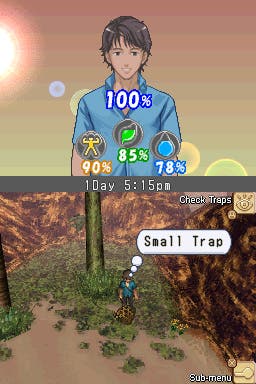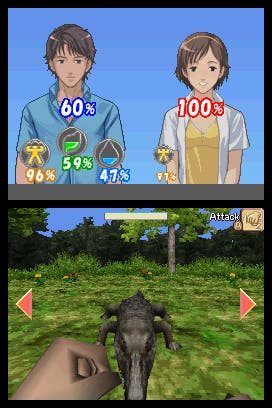Lost In Blue 2
Wandered astray?
There were plenty of reasons not to like Lost in Blue. Personally I adored the game for its charming sense of adventure and unique, oddly touching ambiance, but it had definite problems that quite rightly turned many people away from it within the first few hours. Sexism, though, really wasn't one of them for me. Although the (universally male) game critics who criticised its man-hunt, woman-cook-and-clean portrayal of gender roles deserve points for effort, I really don't believe that there was anything malicious or genuinely upsetting about Lost in Blue's character roles; I think it was probably going for sweet co-dependence, but sadly it did end up coming across as a bit unenlightened.
Lost in Blue's real key problem was that it did very little to help the player. It offered no advice to the floundering novice, scrabbling desperately around in the mud to find edible grubs to keep themselves barely alive whilst they wrestled with their seemingly brain-dead fellow castaway, whose apparent refusal to eat or drink of her own volition drove many of the game's potential fans to distraction. It seemed like a thankless, unforgiving grind - until you learned its tricks. Until you figured out how to fashion more effective weapons, or use traps properly, or catch animals, or learned to tell your companion back in the cave to look after herself for a bit so that she wouldn't die of thirst whilst you popped out to fetch some berries. It was a difficult game, yes, and the game's various technical quirks exacerbated its already unforgiving nature, but it was also incredibly rewarding. Sadly it took a lot of time to master even the basics, and consequently Lost in Blue was full of depth and surprises that hardly anybody ever found.
At heart, Lost in Blue 2 is the same game as its predecessor, and it's got most of the same faults. It's hugely unhelpful, and leaves you to figure out for yourself a lot of information that really should have been in the manual - basic things like how to hunt, or tell your new partner to look after himself (yes, this time you can play as the lady, which should hopefully stop people from throwing allegations of sexism around like it's 1979). And it's a shame that it's so desperately inaccessible, it really is, because there is a rewarding, compelling, even touching game in here, just as there was in the original. You just have to work hard to find it.

It begins in exactly the same way - two late-teens castaways, a girl and a boy, find themselves the only survivors of a shipwreck, lost on an apparently deserted island. Playing as either, you set about making it your home. You start off with nothing, nibbling on raw carrots and burnt clams on the cold stone floor of your cave dwelling, and as you slowly begin to explore the island, the discovery of better resources makes life marginally easier. Day by day, ever so slowly, things improve, until eventually (if you have the patience) you're heading out on five-day expeditions to the furthest reaches of the island, returning to comfy fur beds and a feast of meat stew in your own self-built treehouse. It's a delicate balancing act - there is a constant urge to explore and push your island survivors to the very limit, but anything but the most carefully planned excursions often end in sickness or death. Unless they're kept well-rested, well-stocked and well-fed, young Jack and Amy (marginally less contrived names than the original's Keith and Skye, at least) won't be going anywhere.
Your partner is considerably more helpful this time around, and contributes to your joint survival by cooking, gathering wood, food and water and crafting things like rope and baskets, once you've found the right resources. Although leaving them in the cave for a few days with plenty of water and a good stock of food is no problem, provided that you remember to tell them you'll be gone for a while, it's actually a lot more practical to go exploring together - something that was an absolute chore in the first game.
At the beginning, though, their survival skills aren't exactly honed, meaning that you'll have to do almost everything yourself or risk losing valuable food to your partner's terrible cooking skills. Doing the cooking yourself consists of - yes - a series of different touch-based minigames, which might be either a welcome action-based distraction or a tiresome and repetitive daily chore, depending on your tolerance of such things. However, doing well and discovering recipes rewards your ever-hungry survivors with more satisfying food, a bonus whose value can only be truly apparent to those who spent entire days catching sackfuls of fish in the first game in a vain effort to satisfy their voracious appetites.
Although Lost in Blue 2's island is significantly larger, the process of exploring it and uncovering its secrets is the same - it's the same tantalisingly gradual sense of discovery, the same addictive, rhythmic sequence of day-to-day gathering and survival, of preparation, exploration and recovery. There are new animals to catch, or fight, and new exotic foods to sample, but these changes are minor. However insignificant they might appear, though, these minor tweaks to the mechanics of the game - the cooking, your partner's increased involvement and the different island layout - do much to ease the constant burden of survival. Being able to take your partner with you makes the game less frustrating and rather less difficult, as well as less lonely; it feels like a co-dependant relationship, as opposed to the original's rather forced, gender-specific character roles. It's a little easier to feel attached to the characters, more interesting and satisfying to watch their relationship grow over the course of the game.

But the fact remains that despite minor improvements, Lost in Blue 2 is overwhelmingly similar to last year's game. If you, like me, were one of the twenty-three people in this country who fell in love with it, then that's great news - you'll relish the opportunity to explore and enjoy a whole new island, without the burden of a completely dependant partner. But the experience is only subtly different, and despite the fact that it's slightly less obstinate than its predecessor in several ways, the very nature of Lost in Blue hasn't changed at all. It is still glacially paced and quite unforgiving, and basic survival still takes a lot of effort. Arguably it's really quite an accurate representation of the situation it portrays, in that respect - if you really were stuck on a desert island, you probably would spend the vast majority of your time just trying to keep yourself alive, and not, say, swanning around on the beach in hotpants and flirting with Josh Holloway.
However, the most significant obstacle to most peoples' enjoyment of the first game - namely, the over-dependant partner - has been removed, and so I really hope that Lost in Blue 2 will win a few new fans as well as delighting the old ones. There's a lovely and unique game in here, if you've the patience to find it, and there is something very calming and satisfying about the hard graft and gradual improvement at the game's core.
Lost in Blue has a lot of soul, even though it will probably never get through to most people. Give it another try, and it might just become one of your favourite games.

